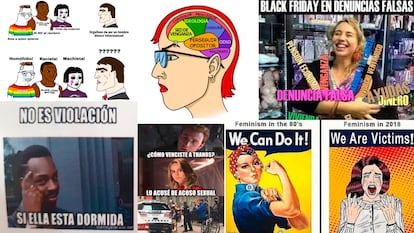‘Manosphere’: Where men who hate women come together for support
Activists for masculine rights, MRAs, MTGOW, incels, pick-up gurus... The anti-feminist corners of the internet provide a network for men who feel victimized by a female-centric society


A Facebook group of divorced men from Spain was recently debating the “false accusations,” “the damage done by the gender violence law,” and making assertions such as “feminism kills more than sexism.” In a more humorous tone, a well-known male forum was analyzing for the umpteenth time whether women seek physical attractiveness, money or status in their partners and concluding that, in any case, “TDS PTS” (an acronym for todas putas or “they’re all whores”).
Meanwhile, on YouTube, an adult man was monetizing his advice on how to master “the game” of seduction. Basically, he said, it is better to belittle your “prey” than to flatter it. And another man from a younger generation explained on TikTok how the “body count” weighs on women after they have passed their “prime” (that is, if they have had many relationships, no one will be interested in them after a certain age). And in another corner of the internet where users share maxillofacial exercises to increase the prominence of their chin, another young man vented: “It’s just ridiculous the amount of shitty experiences I’ve had, and I’m not just referring to minor depressive events like the majority of incels [involuntary celibates] have had... I always fail miserably, with women and with people in general, who seem to feel a legitimate repudiation of my person... It is true that I am ugly and somewhat introverted... Sometimes I enjoy looking at the pain of others after having experienced so much inequality myself.”
All this is happening in the manosphere, an internet universe of online forums, websites, blogs, YouTube channels and social media profiles marked by the defense of a masculinity that is loaded with misogyny, where users feel threatened by the system, women and, above all, feminism. “Parallel to the arrival of feminism in institutions, there has been an anti-feminist retreat that considers itself countercultural, although it defends many conventional male roles,” says Elisa García-Mingo, a sociologist from Spain who spent a year between February 2021 and 2022 diving into online spaces like Forochoches, Hispachan and Spalumi, watching content made by well-known creators such as Papa Maravilla, Roma Gallardo or Un Hombre Blanco Hetero (A White Hetero Male) and by many other anonymous sources. She and fellow researcher Silvia Díaz Fernández shared their findings in a report called Young people in the manosphere: Influence of digital misogyny on their perception of sexual violence, funded by the FAD Foundation.
García-Mingo is sitting in her office at the School of Political Science of Madrid’s Complutense University, perhaps the most conceptually distant place from the manosphere: someone has written on the door of a toilet: “Feminism will be intersectional or it will not be.”
“In Spain the manosphere is less lethal than in other countries,” she explains. In the United States, but also in Canada, the United Kingdom and Sweden, violent acts have taken place that were planned online and authorities are closely monitoring the radicalization of what they describe as “incel terrorism.” In Scandinavian countries the police are investigating links to white supremacists; in Italy, to neofascism. The European Union last year commissioned a report on the subject. Spain’s National Police have no record of any radicalized online forums in a country where “the manosphere has connections with far-right parties like Vox and organizations like Hazte Oír, but it is part of a cultural war, it is more like a bar scene,” says the sociologist, who nevertheless does not downplay its importance: “It promotes a rhetoric that trivializes sexual violence and denies gender violence.” What worries her the most, she says, is “how easily and subtly kids come across this content and how they internalize it, turning it into something emotional that you can no longer refute with arguments or data.” For example: a boy who starts dating girls and Googles “flirt” will soon fall into a spiral of hostile, misogynistic and even self-destructive content. “As parents we are very concerned about porn, but we don’t even think about this,” says García-Mingo.
According to a FAD report from 2021, one in five men between the ages of 15 and 29 in Spain consider gender-based violence an “ideological invention.” And although half (50.4%) consider it a serious problem, this perception has fallen four points since 2017. The expert has a word for this transfer of misogyny from the online realm to the real world: “pollination.” All the respondents spoke about exclusively male WhatsApp groups where they felt “safe,” describing them as “trusted” spaces where men did not feel “judged.”
The tribes
In the jungle of the manosphere, there are different subcultures: MRAs, MTGOW, incels... This caste system is explained endlessly on websites and forums with the meticulous detail of someone describing a Tolkien universe or a deck of Pokémon. There are the “men’s rights activists” (MRA). Their causes are mistreated men, especially in terms of parental custody, and they want to change the laws. “They attack progressives, the wokes, they have articulate speeches, many are lawyers and their goal is to create a new ideological framework and influence society,” says the sociologist. Then there are the more neoliberal flirt gurus (PUA, for pick-up artists), who have “professionalized” their activity, converting it into a business. Along with them, there are misogynistic youtubers with cross-sectional audiences that boast about their “political incorrectness.” The study also analyzed several accounts of anti-feminist women, who have “high symbolic value.”
Then there are the MGTOWs, or men going their own way, whose misogyny has no monetary or social relevance. They do not want to transform anything , but live on the sidelines: they are done with relationships, and their rhetoric is more cynical. “In Spain, there are very few of them, but they are still more numerous than the incels”, says García-Mingo, alluding to the younger, angry, nihilistic and self-deprecating fringe group. “In many misogynistic forums, the term itself is an insult: don’t be an incel they say to each other; they are seen as the wankers, the crybabies, the weirdos.” Ultimately, the men of all these subcultures are united by the feeling of being “victims of the discrimination that living in a society they consider gynocentric means. They are seeking a group identity, their search is not so much for information as for consolation.”
No universe is complete without its own intricate jargon: men can be alphas, sigmas, betas... they can be chads (sexually attractive), normies (normal) , manlets; feminists are branded as allies, manginas or shoulder boys. In addition to TDS PTS, there are gymcels who practice lookmaxing, while the term “hypergamy” articulates the imbalance between the sexes.And of course there is a founding myth, which paradoxically is a scene from Matrix, a film directed by two transsexual women, Lilly and Lana Wachowski. In the scene, Morpheus shows Neo two pills: if he takes the blue one he will continue to live in blissful ignorance, being a slave in the prison of his mind. If he takes the red one, he will discover the Matrix, the truth behind what has always seemed to him to be out of whack in the world. In the manosphere, the red-pill man understands that there is a gynocentric conspiracy to blame for his frustrations and failures. In the film, Keanu Reeves leaves a comfortable reality to be transported to a dystopia, but the red pill doesn’t exactly work like that, since what it provides is the refuge of an echo chamber where opinions are validated by a group of peers. The manosphere has invented a few more pills, the most popular after the red one being the black one, which ends all hope that anything can improve, leading to the cynicism of the MTGOWs and the no-future outlook of the incels.
The most radical level of misogyny is reached gradually, by crossing thresholds, says the sociologist: first on open websites, then on subscription forums, then in shielded environments, private chats, deep internet forums... But above all, she says, the manosphere works because it “satisfies an emotional void and covers the care needs of many men.” Especially the younger ones, those who relate to a generation of girls with a lot of feminist awareness. “Many feel misunderstood and go to these spaces to get information, but also looking to create links because they are very lonely,” says the expert. Thus, identity networks are created that build “a masculinity around feelings of anger, frustration and wounded pride.” It is essential to understand it to fight against it, the expert concludes: “We will not be able to stop the growing misogyny without taking into account the socio-affective needs of men.”
Tu suscripción se está usando en otro dispositivo
¿Quieres añadir otro usuario a tu suscripción?
Si continúas leyendo en este dispositivo, no se podrá leer en el otro.
FlechaTu suscripción se está usando en otro dispositivo y solo puedes acceder a EL PAÍS desde un dispositivo a la vez.
Si quieres compartir tu cuenta, cambia tu suscripción a la modalidad Premium, así podrás añadir otro usuario. Cada uno accederá con su propia cuenta de email, lo que os permitirá personalizar vuestra experiencia en EL PAÍS.
¿Tienes una suscripción de empresa? Accede aquí para contratar más cuentas.
En el caso de no saber quién está usando tu cuenta, te recomendamos cambiar tu contraseña aquí.
Si decides continuar compartiendo tu cuenta, este mensaje se mostrará en tu dispositivo y en el de la otra persona que está usando tu cuenta de forma indefinida, afectando a tu experiencia de lectura. Puedes consultar aquí los términos y condiciones de la suscripción digital.








































